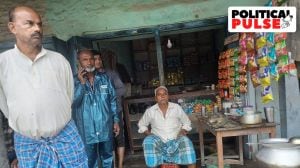Centre suspends Mirwaiz passport
The Centre today cracked the whip on former Hurriyat Conference chairman Mirwaiz Umer Farooq, suspending his passport on the ground that his...

The Centre today cracked the whip on former Hurriyat Conference chairman Mirwaiz Umer Farooq, suspending his passport on the ground that his travel abroad was ‘‘not in the interests of the country’’. Farooq was to leave for Dubai and then the US along with his America-born wife Sheema on Friday.
Invoking Section 10-A of the Passports Act, the Centre gave Farooq eight weeks to appeal against its decision. His passport could be revoked in the future, sources in the Ministry of Home Affairs said. Farooq said he would petition the courts, and that he had already consulted lawyer Ram Jethmalani — who heads the Kashmir Committee — for legal opinion.
The Government has also reportedly decided to crack down on other separatist leaders like Yasin Malik and Sheikh Abdul Aziz and ground their travel abroad to attend conferences and meetings. At any rate, this decision has put a big question mark over the initiation of dialogue between the Centre and separatists.
Chief Minister Mufti Mohammad Sayeed, who had, only on Monday, told The Indian Express that an initiative at the ‘‘highest political level’’ to hold a dialogue with separatists would begin within three months, said he wasn’t worried because ‘‘nobody can stop the process of reconciliation and dialogue’’ in Kashmir.
The Hurriyat, which would have been an ally in this dialogue, read the decision as a push away from the negotiating table.
‘‘On the one hand, they (Centre) talk of dialogue and reconciliation and on the other, they are banning our travel and levelling malicious charges against us. How is it going to help?’’ asked Umer Farooq. ‘‘We had all expected the Centre to broaden the scope of dialogue now that the Gujarat elections were over,’’ he added.
‘‘And the travel ban would have sense if I were going abroad to attend a political function. but It was entirely a family affair.’’
Farooq denied that Hurriyat leaders indulged in India-bashing when they travelled abroad.
‘‘Whenever we get an opportunity to speak inside India or abroad, we speak about the facts. We talk about the political and human rights situation on the ground. As a political and religious leader, it’s my duty to apprise the outside world about the situation in Kashmir,’’ he said.
He also described an allegation that the Hurriyat had asked the Organisation of Islamic Countries to impose economic and oil sanctions on India as ‘‘baseless’’. ‘‘We have never gone that far. This isn’t the Hurriyat’s policy’’.
But if there’s anyone who has to carry the cross of the travel ban announcement, it’s Sayeed and his Peoples Democratic Party.
An early dialogue with the separatists is at the heart of the PDP’s political agenda. The Centre’s decision may have actually heaped more problems onto Sayeed’s plate: in order to balance his efforts to convince the Centre to start an unconditional dialogue with separatists in the Valley, he has reached out to Jammu and Ladakh.
Sayeed’s efforts seemed to have been bearing fruit when Deputy Prime Minister L K Advani recently spoke of the Centre’s commitment to ‘‘hold a dialogue with elected representatives of the state as well as those sections who had not participated in the polls’’. Read, the Hurriyat.
Sayeed took his cue and issued an appeal for talks to the Hurriyat.
And despite his professed enthusiasm, there’s already some grumbling in Srinagar against his policies.
‘‘He hasn’t managed to do much on the Kashmir front. He’s being seen as a representative of Ladakh and Jammu,’’ an editor of a local Urdu newspaper said. ‘‘Mufti needs to play a much more visible role to bring the Centre and the Hurriyat to the negotiating table. It’s not only important for the restoration of peace, it’s imperative for his political survival’’.
A senior PDP leader added, ‘‘He may publicy say he is not worried, but the party can’t ignore what it has promised the people of Kashmir. Good governance and development is fine but we got votes in Kashmir only because we promised a dialogue for a permanent solution of the Kashmir problem.’’
(With ENS in New Delhi)



- 01
- 02
- 03
- 04
- 05




























